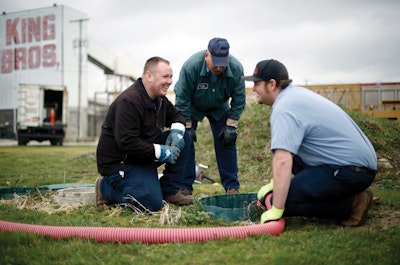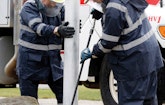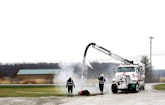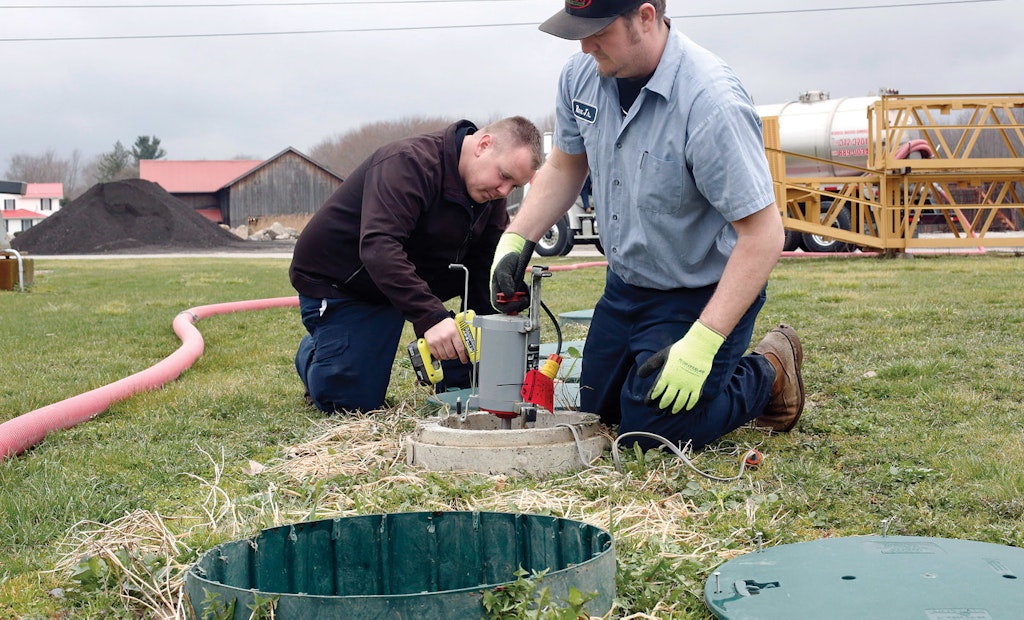Interested in Business?
Get Business articles, news and videos right in your inbox! Sign up now.
Business + Get AlertsRex King Jr. — majority owner of King’s Sanitary Service in Bristolville, Ohio — made a game-changing move in 2016 when he sold the portable restroom arm of his drain cleaning and septic pumping company.
In doing so, the 26-year-old businessman dramatically altered the face of the company he acquired in 2012. By selling roughly 400 restrooms and a luxury restroom trailer to a competitor, he shed a seasonal business with lower profit margins. And by using the proceeds to increase marketing efforts, update aging equipment, and invest in a jet/vac truck with a hydroexcavating package, he positioned King’s Sanitary Service for growth in market sectors that offered higher profits and greater business volume: cleaning sewer lines and exposing utility lines for neighboring municipalities.
“It definitely was a big move for us,” says King, who owns the business along with his father, Rex King Sr., and a silent partner. “There was money to be made in portable restrooms, but not year-round. … And it required a lot of work for profit margins that weren’t high enough. Now I feel like we’re well-positioned for growth in municipal work.”
To avoid going too far into debt, King Jr. bought a used jet/vac truck for $80,000 instead of spending more than $400,000 on a new unit. “When you’re entering a new market, you don’t spend a lot of money as if it’s going to be a sure thing,” he says. “You’ve got to be financially prudent.”
The company makeover reflects key attributes that have enabled King to increase gross revenue by more than 100 percent since he acquired a local company and renamed it King’s Sanitary Service: a conservative fiscal approach; an eye for new, high-potential markets; a willingness to take calculated risks; understanding the importance of embracing and investing in newer technology; and strong support from family, both financial and otherwise.
Truly a family business
As a youngster, King worked for his father, the owner of King Bros., a 61-year-old company that became the family business when Russell and Kenneth King — King Jr.’s grandfather and great-uncle — bought a feed mill at a sheriff’s sale in 1956 and named it King Bros., Feed & Supply. During the next 30 years, the company expanded dramatically. Its services now include installation of residential and commercial septic systems and excavation work, and the company also owns a concrete business, a sand-and-gravel pit, a car wash and a hardware store.
King Jr. says he benefited greatly from his father’s entrepreneurial spirit. “My father is a genius,” he says. “He taught me so much, including how to treat customers, and showed me what a good work ethic is all about. I also can’t say enough about my mother, Mary King, and my grandmother, Marlene Hillman. They’re the backbone of our family.”
From 2009 to 2012, King Jr. worked as a full-time employee for his father, who regularly hired the company that King Jr. now owns as a subcontractor to pump out tanks. When the owner decided to retire in 2012, he talked to his dad about buying the company, which would mesh well with King Bros., septic installation services.
“My father came to me and said here’s what the company does … asked me if this was something I’d want to do,” King explains. “I couldn’t get financing because I was so young (21 years old), so my family helped me finance the purchase. It was a challenge I was willing to accept. … I thought it was a great idea.
“Essentially, what I did in a nutshell was make King Bros., more of a full-service company,” he continues. “King Bros., installs tanks and King’s Sanitary Service pumps them out. There’s a lot going on at King Bros., and the part I own is a small piece of this giant puzzle.”
Making investments
As King’s Sanitary Service grew, so did its roster of equipment. To clean sewer lines and do hydroexcavating work, the company relies on a Vactor 2110 combination truck built on a Sterling chassis. It features a 10-cubic-yard debris tank, a 1,000-gallon water tank, a dual-fan unit, and a water pump (80 gpm at 2,500 psi). The business also owns two skid-mounted water jetters, carried in Ford box trucks; the trucks’ 14-foot insulated/heated box bodies were built by Morgan and Supreme.
One truck carries a US Jetting water jetter equipped with a 600-gallon water tank, Harben pump (15 gpm at 4,000 psi), and a Hatz diesel engine. The other vehicle carries a Mongoose jetter featuring a Caterpillar diesel engine, a 600-gallon water tank, and a water pump that generates 18 gpm at 4,000 psi.
King’s Sanitary Service also owns two push pipeline inspection cameras for televising 4- to 6-inch sewer lines. One is made by Ratech Electronics, and the other is a Vyper model from Jack Doheny.
The company invested in the sewer vac truck after municipalities began to ask King about cleaning large-diameter pipes. “If there’s one thing I hate, it’s telling customers no,” he says. He added the hydroexcavating package because he felt the relatively small additional expense would generate more business — and revenue. “Plus, they’re safer and more cost-effective for excavating,” he explains.
The truck has opened doors to new markets, too, such as a long-term contract to clean large lines at a local auto manufacturing plant. “We couldn’t clean those kinds of lines before, but now we can,” King points out.
Of course, it takes good employees to work all the equipment and keep things running smoothly. King says he’s lucky to have great employees like Kyle Dye, manager; Fred Bell, head septic service tech; Gary Lucik, service technician; Chrystal McCrimmon, office manager; and his mother, Mary, who handles the books. “You’re only as good as your employees,” King notes. “I can do a lot, but I’m only one person.
“We’ve got a great team,” he adds. “We take the calls and get the job done. We often provide same-day service. Everything comes down to providing great customer service, and our employees do a great job. Our customers very rarely get an answering machine; emergency after-hours calls go right to my cellphone. And if we ever make a mistake, we take care of it — make it right.”
Continuing education
While King learned a lot about the business from his father, he says the Water & Wastewater Equipment, Treatment & Transport Show has been a valuable tool in his professional development. The show enables him to see the newest technological advances in-person and offers a convenient way to fulfill Ohio’s requirement for six continuing education credits a year.
“It’s nice because I can pick and choose classes that I’m particularly interested in,” he explains. “If I want to learn about effluent pumps, I can go to this class. And if I want to learn the latest about drainfields and leachfields, I go to another class.”
King says he also benefits greatly from networking with other operators. Because WWETT Show attendees aren’t typically direct competitors, he says they’re more willing to share information, tips and advice. In one instance, he mentioned to a colleague that he was having trouble getting the correct pH level in a customer’s septic tank. “Then he asked me if someone in the house has cancer and is getting chemotherapy treatments,” he says. “That turned out to be the problem. You don’t always find out about things like that unless you talk to people.”
Attending a recent WWETT Show also convinced King to enter a lucrative market for hydroexcavating. While talking about the possible purchase of a combination sewer truck, a representative from Vactor mentioned that a hydroexcavating package would add value to the unit. “That’s what pushed us toward hydroexcavating,” he says.
More growth expected
King says he’s optimistic about further growth, especially in hydroexcavating work and cleaning larger municipal sewer lines. Because even used sewer/hydroexcavating trucks are expensive, most companies are reluctant to buy them, so there’s an inherent barrier to market entry by competitors, he points out.
“We haven’t even owned the (sewer) truck for a year yet, and we’ve already definitely seen an increase in hydroexcavating business,” King says. “We’ve found work for it without even marketing its capabilities. Numerous municipalities have called to ask us to expose (utility) lines. I really see that part of the business taking off in the next year or two.”
King says he’s considering investing in a crawler pipeline inspection camera capable of televising large-diameter lines. “Within about a 45-mile radius, there are probably 10 to 15 smaller municipalities that need help with sewer maintenance. I think we’ll see more and more municipalities hiring out that work because they can’t afford to buy an expensive combination sewer truck that might sit idle most of the time.”











